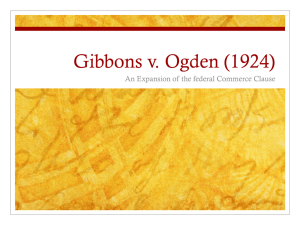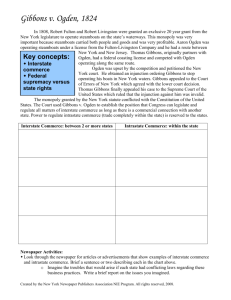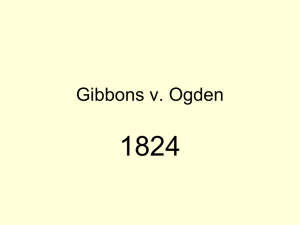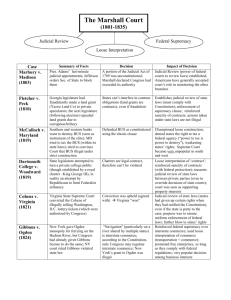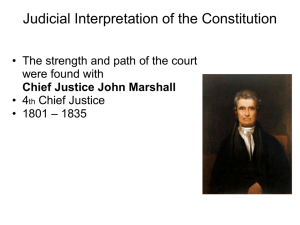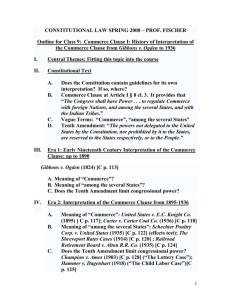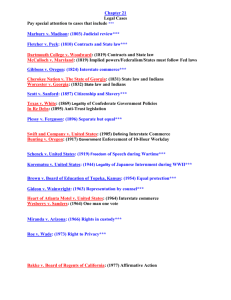Gibbons v. Ogden (1824)
advertisement
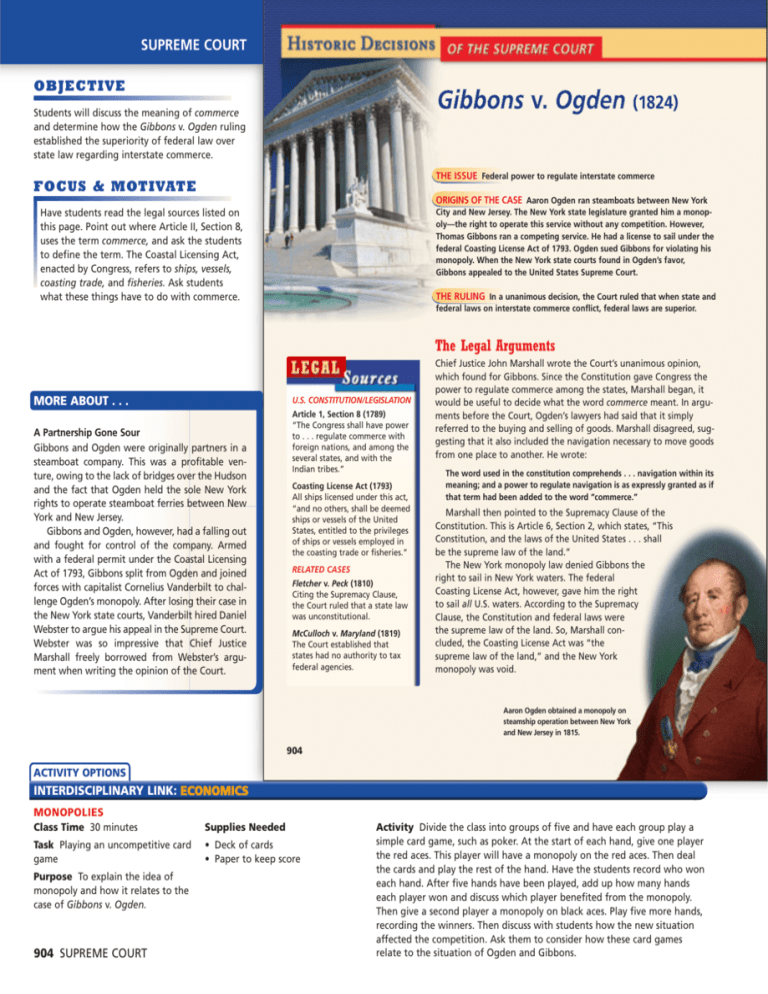
SUPREME COURT OBJECTIVE Gibbons v. Ogden Students will discuss the meaning of commerce and determine how the Gibbons v. Ogden ruling established the superiority of federal law over state law regarding interstate commerce. (1824) THE ISSUE Federal power to regulate interstate commerce FOCUS & MOTIVATE ORIGINS OF THE CASE Aaron Ogden ran steamboats between New York City and New Jersey. The New York state legislature granted him a monopoly—the right to operate this service without any competition. However, Thomas Gibbons ran a competing service. He had a license to sail under the federal Coasting License Act of 1793. Ogden sued Gibbons for violating his monopoly. When the New York state courts found in Ogden’s favor, Gibbons appealed to the United States Supreme Court. Have students read the legal sources listed on this page. Point out where Article II, Section 8, uses the term commerce, and ask the students to define the term. The Coastal Licensing Act, enacted by Congress, refers to ships, vessels, coasting trade, and fisheries. Ask students what these things have to do with commerce. THE RULING In a unanimous decision, the Court ruled that when state and federal laws on interstate commerce conflict, federal laws are superior. The Legal Arguments MORE ABOUT . . . U.S. CONSTITUTION/LEGISLATION A Partnership Gone Sour Gibbons and Ogden were originally partners in a steamboat company. This was a profitable venture, owing to the lack of bridges over the Hudson and the fact that Ogden held the sole New York rights to operate steamboat ferries between New York and New Jersey. Gibbons and Ogden, however, had a falling out and fought for control of the company. Armed with a federal permit under the Coastal Licensing Act of 1793, Gibbons split from Ogden and joined forces with capitalist Cornelius Vanderbilt to challenge Ogden’s monopoly. After losing their case in the New York state courts, Vanderbilt hired Daniel Webster to argue his appeal in the Supreme Court. Webster was so impressive that Chief Justice Marshall freely borrowed from Webster’s argument when writing the opinion of the Court. Article 1, Section 8 (1789) “The Congress shall have power to . . . regulate commerce with foreign nations, and among the several states, and with the Indian tribes.” Coasting License Act (1793) All ships licensed under this act, “and no others, shall be deemed ships or vessels of the United States, entitled to the privileges of ships or vessels employed in the coasting trade or fisheries.” RELATED CASES Fletcher v. Peck (1810) Citing the Supremacy Clause, the Court ruled that a state law was unconstitutional. McCulloch v. Maryland (1819) The Court established that states had no authority to tax federal agencies. Chief Justice John Marshall wrote the Court’s unanimous opinion, which found for Gibbons. Since the Constitution gave Congress the power to regulate commerce among the states, Marshall began, it would be useful to decide what the word commerce meant. In arguments before the Court, Ogden’s lawyers had said that it simply referred to the buying and selling of goods. Marshall disagreed, suggesting that it also included the navigation necessary to move goods from one place to another. He wrote: The word used in the constitution comprehends . . . navigation within its meaning; and a power to regulate navigation is as expressly granted as if that term had been added to the word “commerce.” Marshall then pointed to the Supremacy Clause of the Constitution. This is Article 6, Section 2, which states, “This Constitution, and the laws of the United States . . . shall be the supreme law of the land.” The New York monopoly law denied Gibbons the right to sail in New York waters. The federal Coasting License Act, however, gave him the right to sail all U.S. waters. According to the Supremacy Clause, the Constitution and federal laws were the supreme law of the land. So, Marshall concluded, the Coasting License Act was “the supreme law of the land,” and the New York monopoly was void. Aaron Ogden obtained a monopoly on steamship operation between New York and New Jersey in 1815. 904 ACTIVITY OPTIONS INTERDISCIPLINARY LINK: ECONOMICS MONOPOLIES Class Time 30 minutes Supplies Needed Task Playing an uncompetitive card game • Deck of cards • Paper to keep score Purpose To explain the idea of monopoly and how it relates to the case of Gibbons v. Ogden. 904 SUPREME COURT Activity Divide the class into groups of five and have each group play a simple card game, such as poker. At the start of each hand, give one player the red aces. This player will have a monopoly on the red aces. Then deal the cards and play the rest of the hand. Have the students record who won each hand. After five hands have been played, add up how many hands each player won and discuss which player benefited from the monopoly. Then give a second player a monopoly on black aces. Play five more hands, recording the winners. Then discuss with students how the new situation affected the competition. Ask them to consider how these card games relate to the situation of Ogden and Gibbons. Why Does It Matter Now? At the time of the Gibbons case, navigation of the waters around New York was difficult. To encourage companies to provide water transportation, New York granted monopolies to the companies. Some states set up their own. Other states passed laws preventing New York steamboats from entering their waters. Obviously, such a situation was not good for trade among the states. By making it clear that the federal government regulated commerce among the states, the Gibbons decision brought order to interstate commerce. And this helped the national economy to grow. Unlike other decisions of the Marshall Court that strengthened the federal government, Gibbons proved popular. Most Americans—even New Yorkers—were opposed to the New York steamboat monopoly. They saw any kind of monopoly as a limit to economic competition. As a result, the Gibbons decision was well received throughout the country. One newspaper reported the following incident: Marshall defined “commerce” very broadly in the Gibbons decision. Over the years, Congress has used Marshall’s definition to expand its authority over interstate commerce. Today, Congress regulates practically every activity that affects or is connected to commerce. In 1964, for example, Congress used the Commerce Clause to justify the passage of the Civil Rights Act. This law banned racial discrimination in hotels, restaurants, theaters, and other public places. The Supreme Court rejected two challenges to the Civil Rights Act—in Heart of Atlanta Motel, Inc. v. United States (1964) and Katzenbach v. McClung (1964). In both cases, the Court noted that racial discrimination could harm interstate commerce. H ISTORIC D ECISIONS OF THE SUPREME COURT Why Did It Matter Then? GIBBONS V. OGDEN INSTRUCT • Why was the definition of the term commerce important to this case? • How did the Marshall Court determine that the federal government should regulate interstate commerce? • Why did most Americans applaud the ruling in this case? • How did Congress later associate commerce with the Civil Rights Act? MAKING PERSONAL CONNECTIONS Ask students how they buy things. Can they buy things that are made in a different state? What would happen if their ability to buy out-of-state items were restricted because of a shipping monopoly? Do they think that would be fair? Yesterday the Steamboat United States, [commanded by] Capt. Bunker, from New Haven, entered New York in triumph, with streamers flying and a large company of passengers [celebrating] the decision of the United States Supreme Court against the New York monopoly. She fired a salute which was loudly returned by [cheers] from the wharves. After the first voyage of Robert Fulton’s Clermont in 1807, it soon became clear that operating steamships could be a profitable business. CONNECT TO HISTORY 1. Drawing Conclusions Many of Chief Justice John Marshall’s opinions contributed to the growth of the nationalist spirit in the early 1800s. How do you think the Gibbons v. Ogden decision might have helped to build national unity? See Skillbuilder Handbook, page R13. CONNECT TO TODAY 2. Researching Use library resources and the Internet to find recent Supreme Court cases that involved interstate commerce. Write a brief summary of one of these cases, noting whether it expanded or contracted Congress’s power to regulate commerce. For more information on interstate commerce . . . RESEARCH LINKS CL ASSZONE .COM 905 CONNECT TO HISTORY CONNECT TO TODAY 1. Drawing Conclusions Possible Response Orderly interstate commerce would increase the economic links between people of different regions. They could buy and use similar goods. They could also sell their own products throughout the nation, leading to the development of a national economy. 2. Researching Students might use library sources or the Internet to find recent cases where the Supreme Court addressed interstate commerce. Their summaries should use standard grammar, spelling, sentence structure, and punctuation. Teacher’s Edition 905
